Saying No to the Mafia: a Question of Dignity
Addio Pizzo is a movement born in Sicily in 2004 to promote a "cultural revolution" aimed to defeat the leaders of the Mafia. Within a more comprehensive fight against organized crime, the group's primary commitment is the struggle against extortion, the economic activity that undermines the development of many Sicilian businesses and trades. The real weapon in this battle is "critical consumption", in other words the purchase of goods from merchants who clearly state that they do not pay "pizzo", protection money, to the Mafia.
Francesco Bertolino, former President of Addio Pizzo, and founder of a civic list that oppose the racket, shares with us his point of view on the Mafia phenonmenon and especially on the ways to combat it.
"Addio Pizzo" was born in 2004, what has changed since then?
With no doubts "Addio Pizzo" has significant merits: first of all it made of the racket a topic of discussion, involving common citizens and pushing them to talk about such a delicate issue; it gave them a new alternative, the associationism, which is the fist weapon to defeat the Mafia when the citizen feels left alone and abandoned. The movement, moreover, has carried on an innovative message: being on the side of legality does not mean to be a loser and, actually, can also be profitable.
The association "Addio Pizzo" can be defined as a "response from the ground up" against against organized crime. Is it possible to win this war without the mediation of Public Institutions? What is the relationship between these latter and voluntary associations?
It is absolutely impossible even to think to defeat the Mafia without the help of the State: our movement, in fact, acted in secret at first, but afterwards we sought the support of institutions, which proved to be of great support. "Addio Pizzo," in fact, aims to demonstrate that the State is there and intends to help its citizens.
This history of the Antimafia movement is filled with charasmatic personalities. Is there someone who "Addio Pizzo" finds particularly inspiring?
Definitely Libero Grassi, a businessman that payed with his life his firm opposition to the racket, and he is one of the individuals who started the movement. Grassi's widow, now the honoary president of "Addio Pizzo," is a person at whom we look with great affection and consideration, a "grandma" for all of us.
Personally I am very attached to the figure of the judge Caponnetto as well. He was the first to give visability to the Antimafa pool and wanted in his team people of the caliber of Falcone and Borsellino. Even when he ended his service the judge continued his fight against the Mafia; he visited Sicilian schools, talking to young people, aknowledging them on the issue. Actually we met during one of his "lessons".
Is the Mafia a phenomenon in itself, or can it be compared to other forms of organized crime in the South of Italy? If not, what are the main features that make it unique?
With no doubts the Mafia has its peculiarities: it's the oldest and most well-known criminal organization in the South of Italy and, because of this, it is deeply rooted in the territory. But it must be said that, nowadays, globaliziation has touched also organized crime and it does not make sense anymore to impute certain phenomena exclusively to mafia, or to localize them in a geographic frame.
As shown in the studies by the Centro Impastato, the Mafia phenomenon has a "territorial lordship" in Sicily. Don't you think that we can also talk about a "ideologic lordship"?
Unfortunately, yes. The Mafia intervenes where the citizen is weak, when he thinks he has no choice, where the institutions are inactive. I believe that no one would go with the Mafia if they had an alternative. This is the problem: the Mafia organization offers a "moral model" to those who don't have it; they provide them with assistance, and act like a sort of Social Policy Department fulfilling needs that the State does not satisty. I even heard that documents related to a sort of "Complaints Department" of the racket were found during a recent raid. How could the situation be more clear than this?
After 5 years, can "Addio Pizzo" and the other associations that fight the racket be defined as the new face of the Antimafia?
I leave the judgement to those who watch from the outside, but I can say that "Addio Pizzo" definitely has elements of great novelty with respect to the past Mafia movements. Just think that we offer a different idea of success, of economic prosperity to those who join the association. The preceeding model, instead, was based on sacrifice, a commitment to the cause that one could also pay with life: it enjoyed a lot of sympathy but not too many would dare to fight for it.
Apart from the one of the "pizzo", on which other fronts should we fight to regain dignity?
We must eliminate corruption, the complicity that sometimes exists between the Mafia and the political world. I am not talking about the Bench or the Police, from which we have always received a lot of help. Rather, I refer to the "real political world", the one roling both on a national and a local level. They make it hard to hand down a message of legality and have it accepted by citizens.
How difficult is it to help a Sicilian businessman in subverting the status quo? Do you find a lot of resistance? Is there still a lot of fear in Sicily?
There is still fear and it is understandable, but we're having a good response from traders and businessmen. Just think that today "Addio Pizzo" includes about 400 businesses, while previous antiracket list had an avarage of 10 registered members. This is because the businessman feels protected and knows that the institutions will rembourse and assist him after his denounciation.
How important has been the "buzz" to spread your message and mission? How important is the problem of criminal extortion in the media? Do you think it is depicted correctly?
The buzz is crucial, especially when you consider that we are talking about a spontaneous movement that went from six to thirty members in one month alone. Now the media -- local, national, and international -- talk about us with great emphasis, except for a few cases of misunderstanding
Somebody says that organized crime is changing and is becoming more subtle and insidious. The ethic of the "honored society" doesn't exist anymore, and neither do rules. The members of the Mafia or the Camorra do not have mustaches or carry a shotgun; the new generations are well educated, well-dressed, and often have master's degrees from prestigious universities. Well camuoflaged, crime enters the "good society". Do you agree?
Absolutely yes, this is a very contemporary phenomenon. Maybe the Mafia still exists in its stereotypical forms in small towns,but the real business is outside of those realities, it is much closer to the upper classes, to the "good society".






























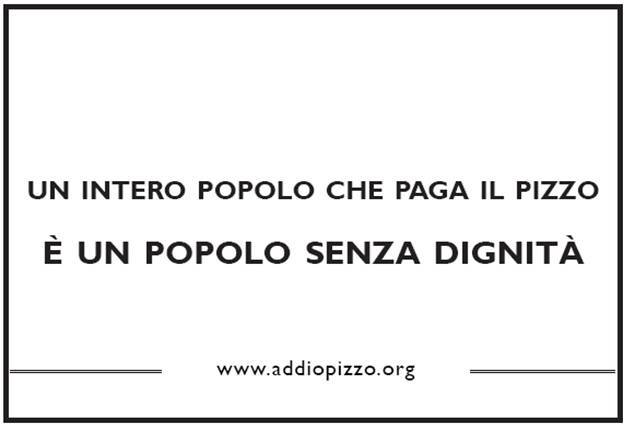

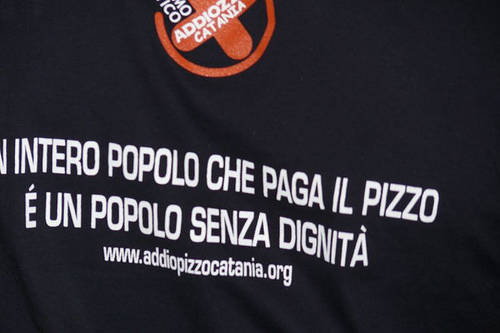
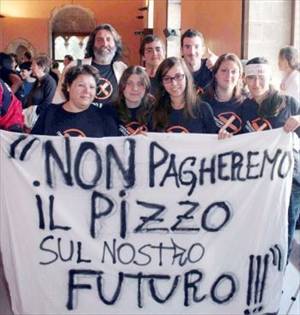
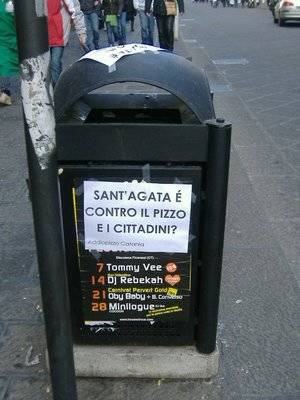
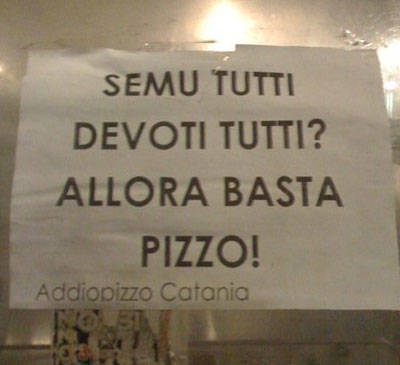
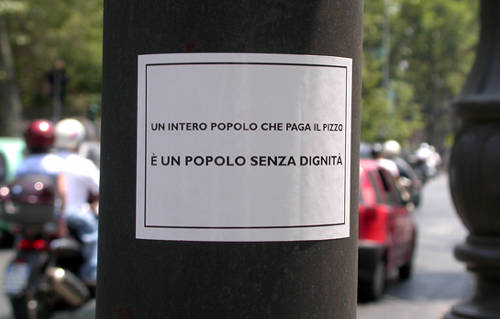
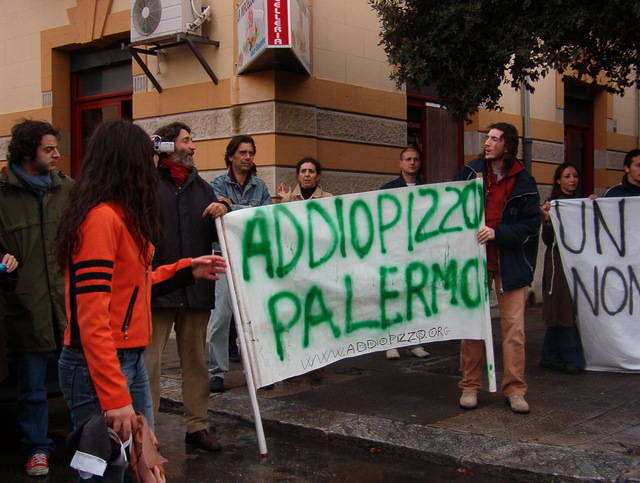
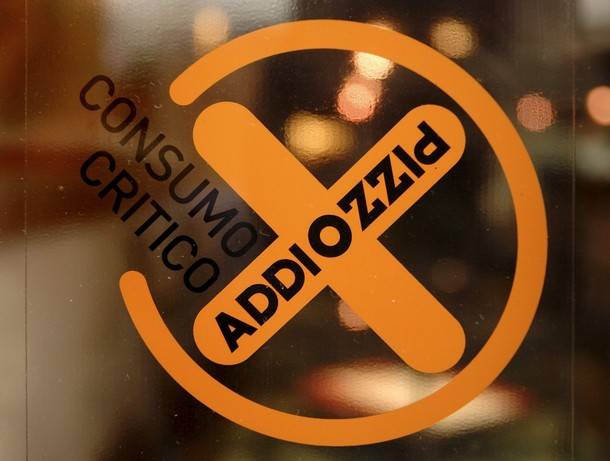



i-Italy
Facebook
Google+
This work may not be reproduced, in whole or in part, without prior written permission.
Questo lavoro non può essere riprodotto, in tutto o in parte, senza permesso scritto.